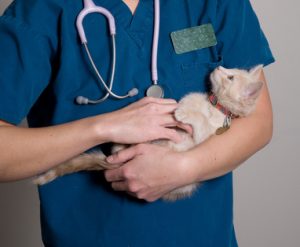Your Pet Doesn’t Feel Well And You Don’t Know Why.
How can you help her feel better again? If you’re paying attention, you usually can spot something wrong before it becomes too big a threat to your pet’s health. Or you can spot an oncoming emergency in time to get her to the veterinarian and minimize any damage to her health. As soon as you notice that she’s just not herself, certainly first we need to figure out why she’s feeling off. Is it really just an “off” day, or is it something serious? Here’s a checklist to help you get to the root of the problem quickly. Does she have diarrhea, is she sneezing, is she dehydrated, are her eyes watering, does she have a rash on her feet and tummy, is she throwing up, is she lethargic, does she feel fevered, is her breathing fast and shallow, does she cry if you try to pick her up, etc.?
Interpreting The Symptoms.
Once you assess all the symptoms, you can begin to figure out the ailment. If she’s throwing up, you need to know–did she chew on a toxic plant, ingest a household poison, swallow a foreign object, overeat at dinnertime? Look back over the previous 24-48 hours. Did you introduce a new diet or treat? Did you give her people food that she’s not used to? If so, then she may have a simple tummy ache. Watch her closely for awhile to see if it resolves on its own. If not, take her in to your veterinarian.
If she has diarrhea, perhaps it’s because of a new diet, food allergy, overeating, intestinal parasite, or even a thyroid imbalance. If your pet has diarrhea, then she’s also dehydrated. Diarrhea not treated for an extended period of time can take your pet’s life–this goes for infant pets as well as seniors. Never underestimate the importance of hydration. See paragraphs below for treatment. If you did in fact feed her people food or introduce a new diet too quickly, then probably no reason to panic. The upset tummy and diarrhea should resolve itself and she’ll feel better within 12-24 hours. Keep her hydrated in the meantime, and get her back to her routine diet. You know your pet–if your instincts tell you something more is going on, always err on the side of caution and get her in to your veterinarian right away.
If you’ve not made any changes in her diet, then it could be an intestinal parasite. Gather a stool sample and take it to your veterinarian for analysis. Intestinal parasites are treated with antibiotics and she should be good as new in a week or so. While this may not seem like an emergency, intestinal parasites left untreated can cause acute anemia in your pet. Also keep in mind that diarrhea can be fatal to your pet. Intestinal parasites are also contagious to any other pets in the home.

If the test for intestinal parasites comes back negative, however, then you should request your veterinarian draw a blood sample to look for other possibilities, for example a thyroid imbalance. Diarrhea can be a distinct signal of thyroid issues. If the blood test results confirm this, the problem is very easily treated with ear drops or a daily pill. See my video in the side panel “How To Pill A Cat.” Dogs, of course, are even easier to “pill.” Just wrap the pill in bacon or peanut butter or whatever–he doesn’t care. 🙂

Pet Poison Helpline publishes a list showing the many indoor and outdoor poisons to be aware of: http://www.petpoisonhelpline.com/poisons/. Examine all your houseplants–outdoor plants too, if she goes outside. Do any of the leaves appear to be chewed? Look through your house for any possible household poisons within the pet’s reach. Examine her toys–do any of them appear damaged and maybe the stuffing is coming out or pieces are missing? Are any of your socks or scrunchies missing? If you can answer yes to any of these, then feel her abdomen. Does she cry out or flinch? If so, then get her to the veterinarian ASAP. She may have swallowed a foreign object or be in toxic shock from a poisonous plant, and EVERY MOMENT COUNTS. Don’t waste any time — GO.

If she’s sneezing and her eyes are watering, maybe she has a respiratory bug, or simple allergies? If the nasal discharge is clear, then hopefully it’s just seasonal allergies. If it’s green and getting thick, then it’s more likely a respiratory virus. Either way, your veterinarian can advise you the proper treatment. Make an appointment to take your pet in. Doubtful it’s an emergency, but still not to be ignored. Plus, respiratory ailments are contagious to other pets in the home, so the sooner you get her treated, the better.
What about a rash? If your pet has a rash on her feet pads or tummy, it could be a couple of things. Outside: did you just fertilize your yard or spray weedkiller? As soon as she walks on it, or sits or lays, it could be irritating her skin. Keep her indoors for several days after these applications. Be sure the patio and sidewalks are hosed down to get rid of residue. Inside: what do you clean your floors with? If you use bleach or a harsh cleaner, that may be irritating her delicate skin and feet. Be sure you rinse the floor thoroughly after cleaning–twice to be safe.
What Do I Do?
First, be certain she’s kept hydrated. A great item to always keep on hand is unflavored Pedialyte. You can find it in the baby department of any grocery store or pharmacy. Or you can get it online from Amazon. See the icon below for purchase. Add Pedialyte to your pet’s water dish. If your pet is feeling poorly enough that she’s avoiding the water dish, then give it to her full strength from an eye dropper and start her on sub-q fluids. Continue this until you can get her in to your veterinarian. Once you get fluids in her, you’ll see her begin to perk up pretty quickly. If your pet is feeling rotten enough that she’s not even getting out of bed or sitting up, then definitely get her to the veterinarian sooner than later.
You can determine if a pet is dehydrated by pinching and lifting the skin between her shoulder blades or hips. When you let go, does the skin spring back to her body, or does it stay pinched and standing? If it doesn’t bounce back, then you have a dehydration problem. Be very mindful that dehydration can ultimately be fatal for any pet. You must act quickly to treat it. You can get the sub-q fluids and supplies from your vet, and they can also show you how to administer the fluids.

Whatever else you do, ALWAYS keep your pet hydrated. I have brought MANY of our rescue pets back from the brink of death with Pedialyte and sub-q fluids–seniors and infant pets as well. Too often, kittens and puppies are taken from their mothers much too soon (12 weeks is ideal, anything younger puts them at risk). An infant kitten or puppy can die very quickly of simple diarrhea and dehydration. If your pet has diarrhea, then she’s also dehydrated. Diarrhea not treated for an extended period of time can also take your pet’s life. Never underestimate the importance of hydration.
Second–don’t panic. Pets can have “off” days and feel generally poopie just like us. It may not be serious, BUT–on the off chance something is seriously wrong, DON’T ignore the symptoms. Keep very close watch and be prepared to act quickly if needed.
How Can I Know If It’s Something Serious?
Does she seem to be in acute distress? Is she crying, whining, breathing heavily, or breathing fast and shallow, is she shaking, is her abdomen tender to the touch, is she unable to stand, does she cry if you try to pick her up? These are signs of something very serious–get her to your veterinarian ASAP. It’s much better to rush her to the vet and find out it’s nothing serious, than to have ignored the signs and end up losing your pet for lack of timely treatment.
REMEMBER: the best thing you can do for your pet’s health is to PAY ATTENTION. If you catch something quickly, you can minimize the negative impact it might otherwise have on your pet.
** ** ** ** ** ** ** ** ** ** ** ** ** ** ** ** ** ** **
God Bless and Happy Pet Parenting!
With love and good wishes,
jeannie. ?
About jeannie: I’ve been pro-actively involved in pet rescue all of my life. I founded Milagro Senior Pet Refuge© (Phoenix) in 1998, and BareFootPets (TM) in 2008. Animal welfare has always been and will always be my heart’s work. If my only legacy is that I save a handful of precious souls that would not survive otherwise, I’m good with that.

